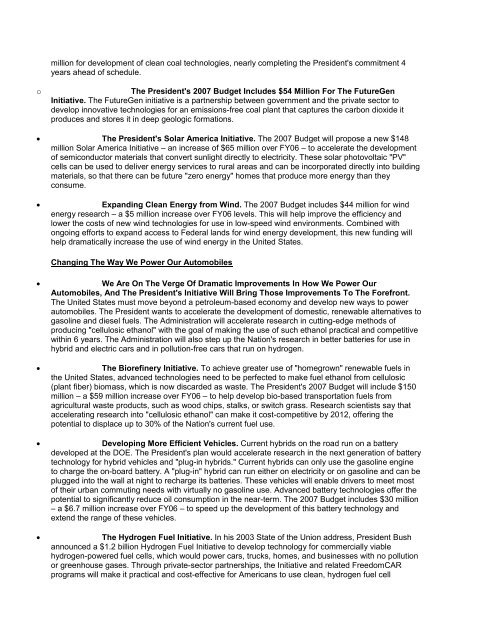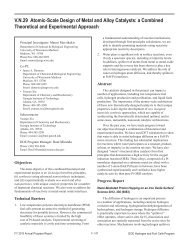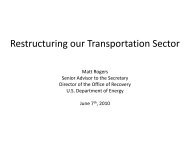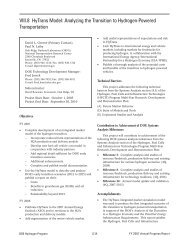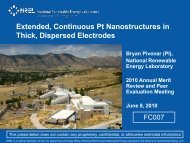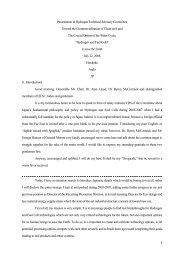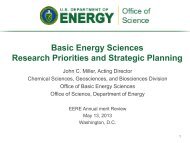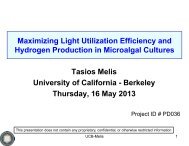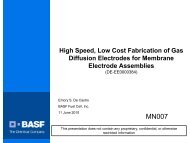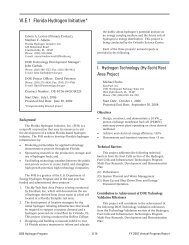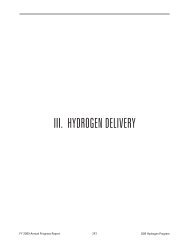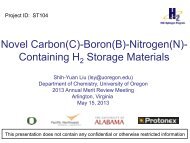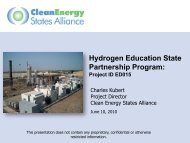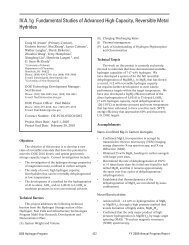Advanced Energy Initiative - DOE Hydrogen and Fuel Cells Program ...
Advanced Energy Initiative - DOE Hydrogen and Fuel Cells Program ...
Advanced Energy Initiative - DOE Hydrogen and Fuel Cells Program ...
You also want an ePaper? Increase the reach of your titles
YUMPU automatically turns print PDFs into web optimized ePapers that Google loves.
million for development of clean coal technologies, nearly completing the President's commitment 4<br />
years ahead of schedule.<br />
o<br />
The President's 2007 Budget Includes $54 Million For The FutureGen<br />
<strong>Initiative</strong>. The FutureGen initiative is a partnership between government <strong>and</strong> the private sector to<br />
develop innovative technologies for an emissions-free coal plant that captures the carbon dioxide it<br />
produces <strong>and</strong> stores it in deep geologic formations.<br />
• The President's Solar America <strong>Initiative</strong>. The 2007 Budget will propose a new $148<br />
million Solar America <strong>Initiative</strong> – an increase of $65 million over FY06 – to accelerate the development<br />
of semiconductor materials that convert sunlight directly to electricity. These solar photovoltaic "PV"<br />
cells can be used to deliver energy services to rural areas <strong>and</strong> can be incorporated directly into building<br />
materials, so that there can be future "zero energy" homes that produce more energy than they<br />
consume.<br />
• Exp<strong>and</strong>ing Clean <strong>Energy</strong> from Wind. The 2007 Budget includes $44 million for wind<br />
energy research – a $5 million increase over FY06 levels. This will help improve the efficiency <strong>and</strong><br />
lower the costs of new wind technologies for use in low-speed wind environments. Combined with<br />
ongoing efforts to exp<strong>and</strong> access to Federal l<strong>and</strong>s for wind energy development, this new funding will<br />
help dramatically increase the use of wind energy in the United States.<br />
Changing The Way We Power Our Automobiles<br />
• We Are On The Verge Of Dramatic Improvements In How We Power Our<br />
Automobiles, And The President's <strong>Initiative</strong> Will Bring Those Improvements To The Forefront.<br />
The United States must move beyond a petroleum-based economy <strong>and</strong> develop new ways to power<br />
automobiles. The President wants to accelerate the development of domestic, renewable alternatives to<br />
gasoline <strong>and</strong> diesel fuels. The Administration will accelerate research in cutting-edge methods of<br />
producing "cellulosic ethanol" with the goal of making the use of such ethanol practical <strong>and</strong> competitive<br />
within 6 years. The Administration will also step up the Nation's research in better batteries for use in<br />
hybrid <strong>and</strong> electric cars <strong>and</strong> in pollution-free cars that run on hydrogen.<br />
• The Biorefinery <strong>Initiative</strong>. To achieve greater use of "homegrown" renewable fuels in<br />
the United States, advanced technologies need to be perfected to make fuel ethanol from cellulosic<br />
(plant fiber) biomass, which is now discarded as waste. The President's 2007 Budget will include $150<br />
million – a $59 million increase over FY06 – to help develop bio-based transportation fuels from<br />
agricultural waste products, such as wood chips, stalks, or switch grass. Research scientists say that<br />
accelerating research into "cellulosic ethanol" can make it cost-competitive by 2012, offering the<br />
potential to displace up to 30% of the Nation's current fuel use.<br />
• Developing More Efficient Vehicles. Current hybrids on the road run on a battery<br />
developed at the <strong>DOE</strong>. The President's plan would accelerate research in the next generation of battery<br />
technology for hybrid vehicles <strong>and</strong> "plug-in hybrids." Current hybrids can only use the gasoline engine<br />
to charge the on-board battery. A "plug-in" hybrid can run either on electricity or on gasoline <strong>and</strong> can be<br />
plugged into the wall at night to recharge its batteries. These vehicles will enable drivers to meet most<br />
of their urban commuting needs with virtually no gasoline use. <strong>Advanced</strong> battery technologies offer the<br />
potential to significantly reduce oil consumption in the near-term. The 2007 Budget includes $30 million<br />
– a $6.7 million increase over FY06 – to speed up the development of this battery technology <strong>and</strong><br />
extend the range of these vehicles.<br />
• The <strong>Hydrogen</strong> <strong>Fuel</strong> <strong>Initiative</strong>. In his 2003 State of the Union address, President Bush<br />
announced a $1.2 billion <strong>Hydrogen</strong> <strong>Fuel</strong> <strong>Initiative</strong> to develop technology for commercially viable<br />
hydrogen-powered fuel cells, which would power cars, trucks, homes, <strong>and</strong> businesses with no pollution<br />
or greenhouse gases. Through private-sector partnerships, the <strong>Initiative</strong> <strong>and</strong> related FreedomCAR<br />
programs will make it practical <strong>and</strong> cost-effective for Americans to use clean, hydrogen fuel cell


